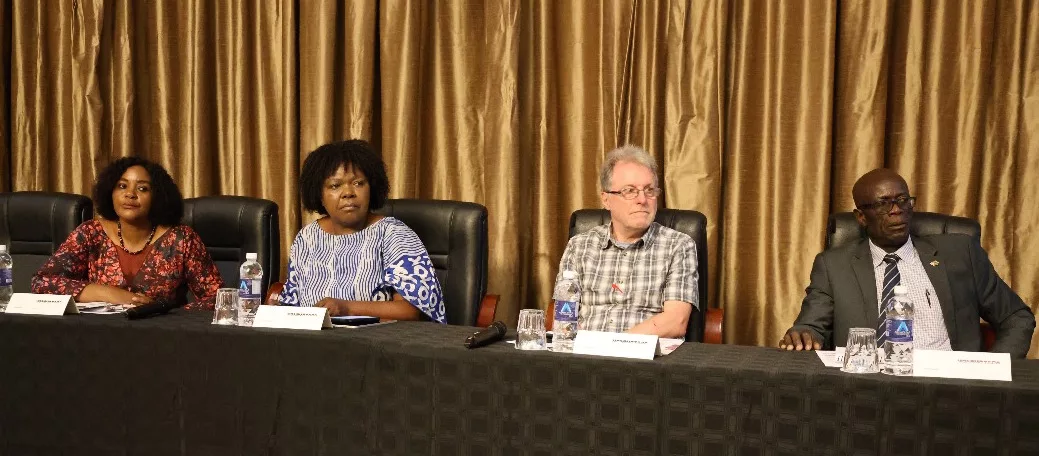|
Getting your Trinity Audio player ready...
|
Since gender-based violence poses a significant challenge, not just for Zimbabwe, but globally, the African Union (AU) is in the process of drafting a landmark Convention on the Elimination of Violence Against Women and Girls (AUCEVAWG).
In her welcome remarks, the Permanent Secretary for Women Affairs, Community, Small and Medium Enterprise Development, Dr. Mavis Sibanda at the Consultative meeting on the development of the African Union Convention on the Elimination of Violence Against Women and Girls held at the Crowne Plaza Monomotapa Hotel in Harare today, said the initiative represents a significant step forward in collective continental efforts to combat violence against women and girls.
“We applaud the African Union Heads of States for their wisdom in calling for the development of our own African continent’s homegrown convention on the Elimination of Violence Against Women and Girls.
“Indeed, a homegrown African Convention on the Elimination of Violence Against Women and Girls is not just a necessity; it is an opportunity to create a meaningful and lasting impact on the lives of women and girls across our continent,” Dr. Sibanda said.
The convention will allow stakeholders to tailor approaches to the unique cultural, social, and economic contexts of African nations. By grounding the Convention in shared values and traditions, stakeholders can ensure that it resonates with the communities it aims to protect.
Further, by adopting a continental framework, stakeholders foster regional solidarity and collaboration among African nations. This shared commitment to eliminating violence against women and girls strengthens the collective resolve and allows the sharing of best practices and lessons learned.
“Most importantly, by creating our own Convention, Africa can take a leading role in the global fight against violence towards women and girls. This positions our continent as a proactive force in addressing human rights issues, setting an example for other regions to follow.
“There is, therefore, a need to join forces with our fellow African nations to shape a guiding instrument that effectively addresses GBV. The Ministry will therefore participate in the negotiation processes on the development of this convention at the African Union Headquarters next week. I am informed that consultations with civil society organisations have already been conducted and some civil society organisations from Zimbabwe participated virtually and or physically,” Dr. Sibanda added.
Zimbabwe, as a member of the African Union, was urged to ensure that the aspirations and priorities of its people are not only heard but actively integrated into the development of this Convention.
Addressing the same gathering, Michelle Mutogo, the Interim Executive Director of Rozaria Memorial Trust said the AUCEVAWG was born out of the recognition that violence against women and girls (VAWG) remains a critical issue despite existing legal frameworks, such as the Maputo Protocol (Protocol to the African Charter on Human and Peoples’ Rights on the Rights of Women in Africa) and various international commitments like the Convention on the Elimination of All Forms of Discrimination Against Women (CEDAW).
She said the convention was proposed to strengthen the legal landscape by creating a specific binding instrument to address the persistent and pervasive violence experienced by women and girls in Africa, focusing on both prevention and response, adding that it builds on decades of advocacy by African women’s rights organizations and civil society actors, who have long called for more comprehensive and effective tools to combat GBV.
Although African states have made significant strides in creating gender-sensitive policies, Mutogo said the implementation gap remains wide.
High rates of intimate partner violence, sexual violence, harmful traditional practices such as female genital mutilation (FGM) and child marriage, and conflict-related sexual violence persist across many African countries.
The AUCEVAWG seeks to address these challenges by:
– Providing a continent-wide legal framework for combating VAWG.
– Establishing accountability mechanisms for states to implement and monitor progress.
– Reinforcing international and regional commitments to the protection of women’s rights.
– Promoting collaborative efforts between governments, civil society, and international actors in combating VAWG.
Key Milestones
2019, the African Union Assembly of Heads of State and Government acknowledged the need for a legally binding convention to end violence against women and girls. This marked the beginning of official discussions around the creation of the AUCEVAWG.
A Zero Draft of the AUCEVAWG was developed with input from various stakeholders, including member states, civil society organizations, and human rights bodies.
Objectives of the Convention
– The convention aims to hold states accountable by mandating the adoption of national laws and policies that prohibit all forms of violence against women and girls.
– It emphasizes preventive measures, including education, public awareness, and community mobilization, to address the root causes of GBV.
– The convention calls for comprehensive services for survivors, such as legal, medical, and psychological support, and the protection of victims and witnesses during legal proceedings.
-It proposes the establishment of a monitoring framework to track the implementation of commitments and progress made by member states.
– The convention focuses on the eradication of harmful cultural and traditional practices that perpetuate violence, such as FGM and child marriage.
Importance in the Broader African Women’s Rights Agenda
The AUCEVAWG is seen as an essential addition to the African human rights architecture. It is expected to reinforce other key frameworks such as:
– The Maputo Protocol (2003) The first comprehensive treaty on women’s rights in Africa.
– Agenda 2063- Africa’s strategic framework for socio-economic transformation, which includes gender equality and women’s empowerment as key pillars.
– The Beijing Declaration and Platform for Action (1995)- A global framework for women’s rights and gender equality.
In essence, the AUCEVAWG aims to harmonize and enhance the African Union’s approach to ending violence against women and girls, creating a safer, more equitable environment for women across the continent.






